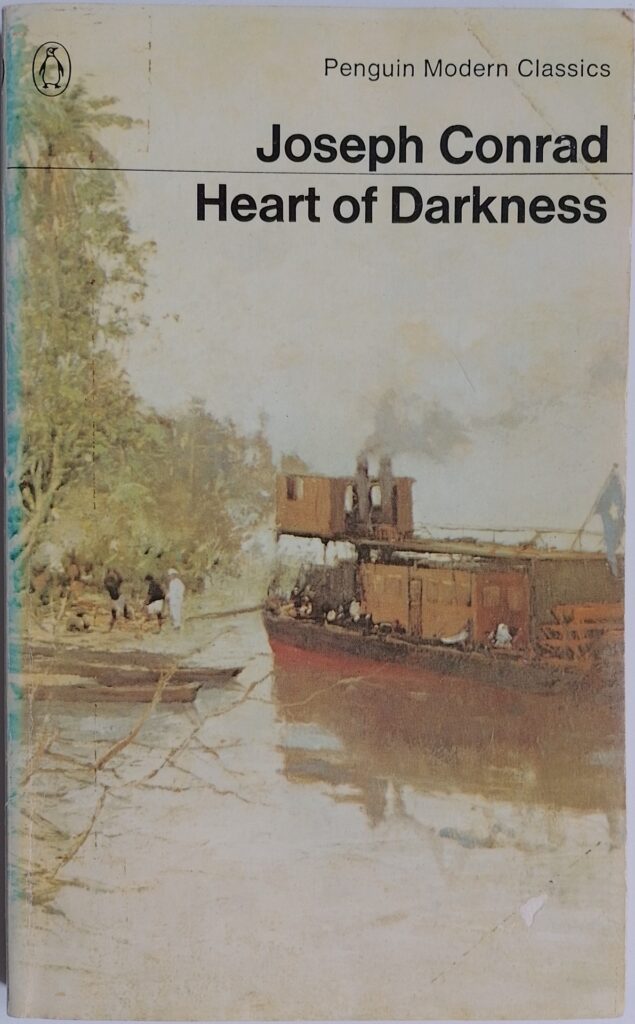First published 1902. Penguin, paperback, 1980, pp 111, c.40,000 words.
Is this the best novel ever written? At least a contender in my book.
A small ship is anchored in the Thames estuary, stemming the flood, awaiting the ebb, so its journey can continue out to sea. As evening falls, the crew gather, and one, Marlow, begins to speak. He starts by recalling the Roman invasion of Britain, enabled by superior military organisation, driven by the desire to grab what they could. He likens this to the European invasion of Africa, in full swing when this was written. ‘It was just robbery with violence… men going at it blind – as is very proper for those who tackle a darkness.’ [p10] In that word he foreshadows all that follows. Unearthly flames light the river as the sun sets, then Marlow launches into his main tale of when he was once a riverboat captain, steaming into the heart of Africa. The listening crew know they are ‘fated … to hear about one of Marlow’s inconclusive experiences.’ [p10]
The tale Marlow tells is a dream sequence. He had a desire to explore unknown territory, the blank places on the map he saw as a child, particularly the long river, a snake with its head in the sea and its tail winding into the unknown heart of Africa. He is commissioned by a French company to captain a steam-ship on the river, but when he gets there he finds a deeply unhealthy place, disorganised and full of petty rivalries. His ship has been holed and stuck up river. He has to spend months on repairs but is frustrated by a lack of rivets with which to fasten replacement plates. He hears tales of the fabled agent at the farthest reaches up the river, a man named Kurtz, who has sent down more ivory than all the other agents put together.
The dream jumps, and now he and a group of company representatives, as well as a dragooned company of Africans, are steaming up river. The jungle oppressively crowds its banks, and all is either strangely silent or filled with unearthly calls or mysterious drumming. Hazards abound; no one knows what lies around the next bend. The other company men are scheming against Kurtz. Savagery is present in all; portents of trouble ahead appear.
The atmosphere that Conrad creates is masterful. The air of menace, the dream-like quality of the endless river, the lure of the journey, the savagery all around and within. The Europeans are more prone to violence than any of the Africans. This is the descent into hell, driven by the desire to see inside our own hearts, to see what lies there – the lure of the dark side. The idea of the dream is made explicit at one point and it becomes a struggle of the soul, but who’s? Kurtz’s or Marlow’s? Are they one? Temptation is out there: the lust for primitive power, free of all constraints, an escape from hidebound Victorian morality. The spell cast by the wilderness, the ‘awakening of forgotten and brutal instincts, by the memory of gratified and monstrous passions.’ [p94] Kurtz seems to have cut himself loose, leaving nothing above or below. Is he mad? Is he real, or has he been made myth? He is too much of a threat to the established order, and his life must be made to ebb away. And in Kurtz’s death Marlow comes to realise that ‘The most you can hope from [life] is some knowledge of yourself – that comes too late – a crop of unextinguishable regrets.’ [p100]
After Marlow’s return, he encounters several people to whom he distributes Kurtz’s writings. A journalist who knew him says: ‘…how that man could talk. He could electrify large meetings. … He could get himself to believe anything – anything. He would be a splendid leader of an extreme party.’ [p104] Remind you of anyone?
The book ends with a meeting with Kurtz’s fiancée, who is in perpetual mourning. It is evening and growing dark. In her sitting room a grand piano looks like a polished sarcophagus.
Conrad’s writing is all about the atmosphere. We are drawn in, sometimes with paragraphs that run over two or more pages. His adjectives, similes and metaphors pile up but don’t seem forced. His language is always clear. I stumbled only on ‘factitious’ (meaning ‘artificial’ apparently) and ‘tenebrous’ (dark, gloomy). Some might be offended today by his use of the word ‘nigger’, but in reading the text Conrad is clearly more sympathetic to the Africans than the rapacious Europeans.
This is a slight book, so easily digestible. I know of no other works that evoke and sustain such an atmosphere of gathering menace and that look so deeply into our souls.
Wikipedia biography of Conrad: https://en.wikipedia.org/wiki/Joseph_Conrad
Wikipedia summary of the book: https://en.wikipedia.org/wiki/Heart_of_Darkness
Others’ reviews of the book: https://www.goodreads.com/book/show/4900.Heart_of_Darkness?ref=nav_sb_ss_1_16
© William John Graham, September 2022

